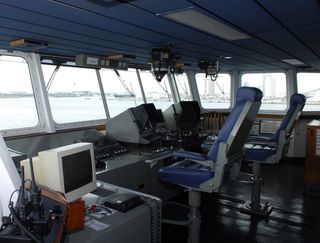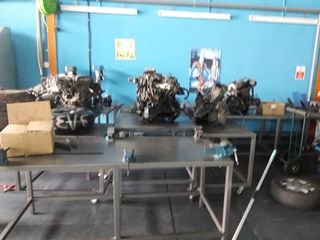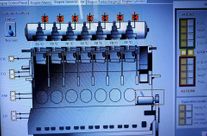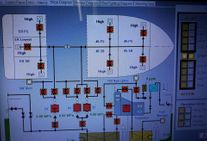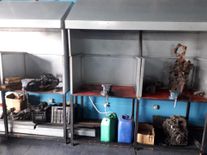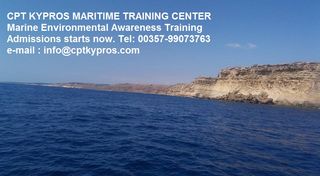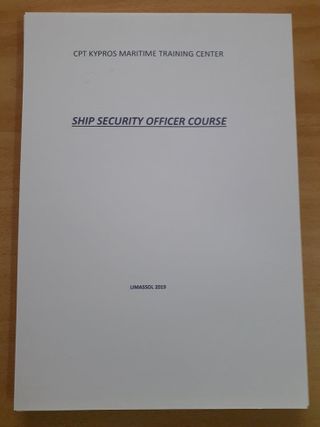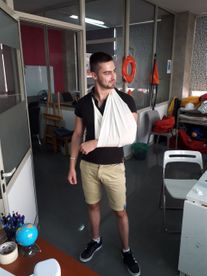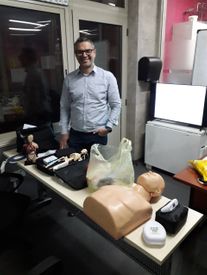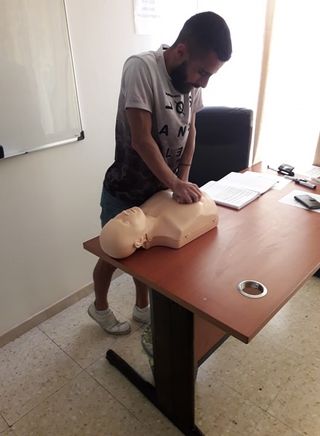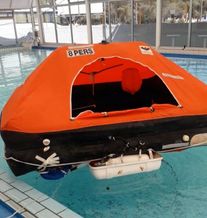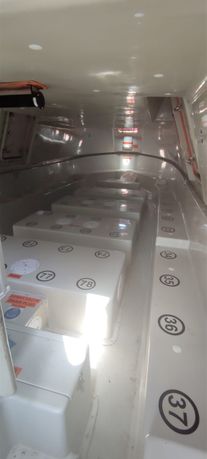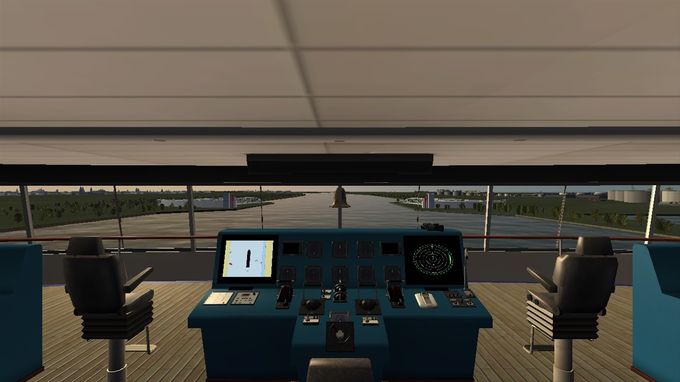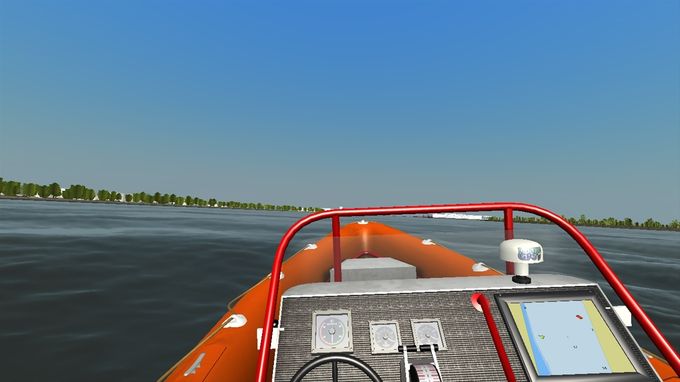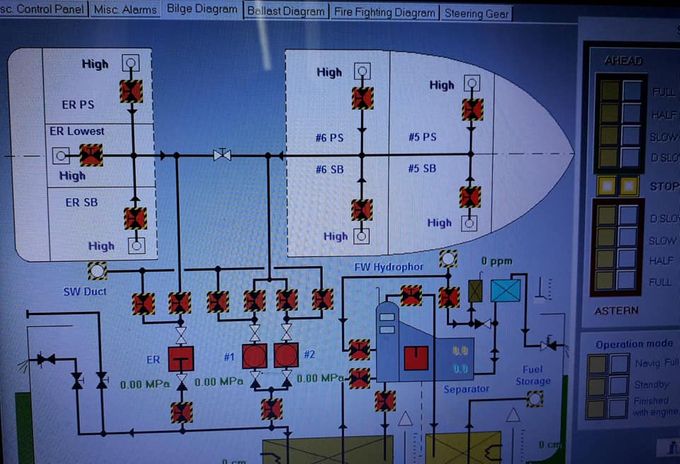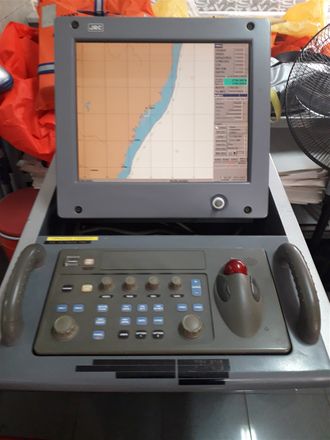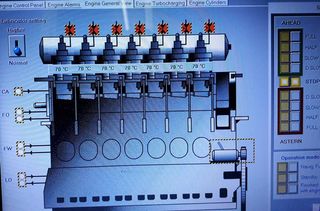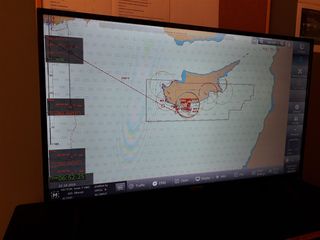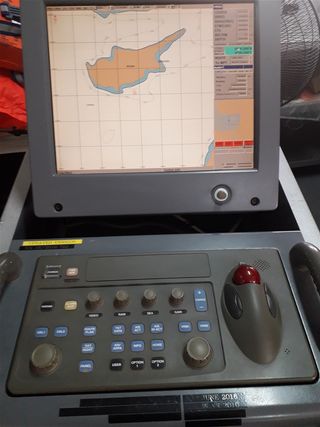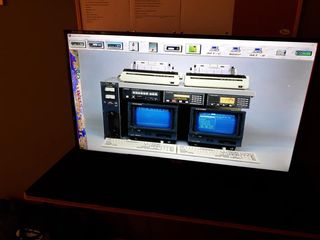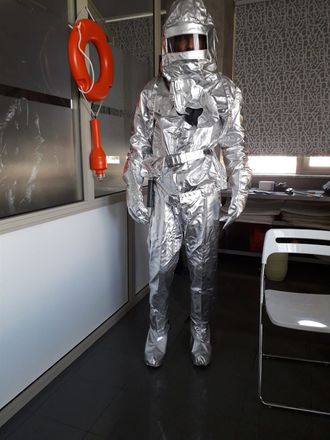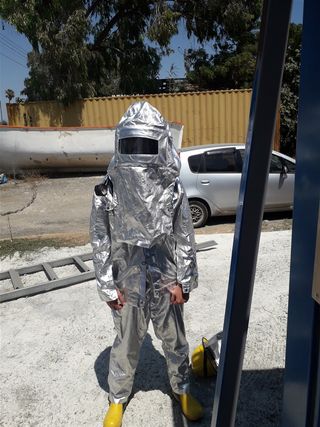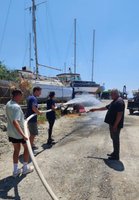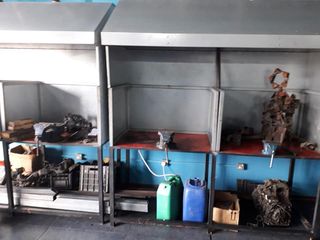CPT KYPROS SHIPPING LTD
Latest comments
10.10 | 09:27
Καλημέρα Νικόλα. Το πόσα μέτρα είναι αναλόγως εμπειρίας.
το Κόστος είναι 400 ευρώ
APPROVED BY HONDURAS ADMINISTRATION Resolution No DGMM/086/20
OFFICER IN CHARGE OF A NAVIGATIONAL WATCH MODEL COURSE 7.03
This Model course comprises three functions at the operational level. On Successful completion of the training and assessment trainees should be competent to carry out safely the watch-keeping duties of an officer in charge of a navigational watch, both at sea and in port. In particular, they will be fully conversant with the basic principles to be observed in port. In particular, they will be fully conversant with the basic principles to be observed in keeping a navigational watch as per STCW regulation VIII/2 and STCW Code , chapter VIII.
MASTER AND CHIEF MATE M.C.7.01
This model course comprises three functions at the management level. On Successful Completion of the course and the requisite watch-keeping experience, officers will prepared for taking full responsibility for the safety of the ship, its passengers , crew and Cargo. They will be aware of their obligations under international agreements and conventions concerning safety and the protection of the marine environment and will be prepared for taking the practical measures necessary to meet those obligations. In this model course , One combined course has been written for both Masters and Chief Officers.
The material is set out assuming that trainees have previously completed the operational level training content required for watch-keeping officer and they have some watch-keeping experience. This does not preclude some of the content for both levels being run within the same training course but it is very important that trainees are familiar with the operational level content before attempting to develop the management level competence outlined in this model course.
Officer in Charge of an Engineering Watch
This model course comprises four functions at the operational level. On successful completion of the training and assessment trainees should be competent to carry out safely the watch-keeping duties of an officer in charge of an engineering watch in a manned engine-room or designated duty engineer in a periodically unmanned engine-room, both at sea and in port. In particular, they will be fully conversant with the basic principles to be observed in keeping an engineering watch as per STCW regulation VIII/2 and STCW Code, chapter VIII.
CHIEF ENGINEER OFFICER AND SECOND ENGINEER OFFICER IMO M.C 7.02
This model course comprises four functions at the management level. On Successful completion of the course and the requisite watch-keeping experience, officers will be prepared for taking full responsibility for the safely of the ship, its passengers, crew and cargo. They will be aware of their obligations under international agreements and conventions concerning safety and the protection of the marine environment and will be prepared for taking the practical measures necessary to meet those obligations. In this model course, one combined course has been written for both chief engineer officer and second engineer officer. The material is set out so that it can be run separately from the course for officer in charge of an engineering watch, but this is not intended to imply that it has to be run separately. It has been written in this manner so as to give Administrations the opportunity to arrange a structure best suited to their needs. The teaching schemes should be carefully scrutinized to ensure that all of the tabulated training outcomes are covered, that repetition is avoided and that essential underpinning knowledge at any stage has already been covered. A certain amount of duplication under different subjects will probably occur, provided it is not excessive, the different approaches can provide useful reinforcement of work already learned. Care should be taken to see that items not included in the syllabus or treatment beyond the depth indicated by the objectives have not been introduced except where necessary to meet additional requirements of the administration. The teaching scheme should be adjusted to be take account of those matters and the timing of any modular courses (Such as training in Fire Fighting, which are not be included.
Marine Environmental Awareness model course 1.38
MARINE ENVIRONMENTAL AWARENESS Model course 1.38 Those who have successfully completed the course will be able to demonstrate knowledge and understanding of the importance of preventing pollution to the (marine) environment. This knowledge and understanding shall include, but is not limited to the following topics: • Concept of sustainable shipping • Complexity and diversity of the marine environment • Impact of shipping on the environment • Role of regulations, procedures and technical installations to the protect environment • Marine environmental awareness, Personal responsibility • Role of human element to prevent pollution, proactive measures. Those who have successfully completed the course shall demonstrate the intention to : • Fully observe procedures for monitoring ship-board operations and ensure • Act to ensure that positive environmental reputation of shipping is maintained.
BASIC SAFETY TRAINING
BASIC SAFETY duration 11 days 1st ELEMENT: PERSONAL SURVIVAL. This Syllabus covers the requirements of the 1995 STCW Convention chapter VI Section A-VI/1, Table A-VI/1-1. A trainee Successfully completing this course will be able to react in a correct manner during emergency situations, take measures appropriate to his own survival, the Survival of the others and use survival equipment correctly. He will also acquire knowledge , which in some instances will enable him to identify and corrects defects and thereby prevent emergencies. 2nd ELEMENT: FIREFIGHTHING .This Syllabus covers the requirements of the STCW 1995 Convention chapter VI, Section A-VI/1 Table A-VI/1-2.This course will enable the trainee to react in the correct manner in the event of an outbreak of fire, to take appropriate measures for the safety of personnel and of the ship ,and to use the fire appliances correctly. He will also be able to state and demonstrate that he has acquired Knowledge and skills which in some instances will enable him to identify and correct defects and his prevent fires from occurring. 3rd ELEMENT: ELEMENTARY FIRST AID. This syllabus covers the requirements of the STCW 95 Convention Chapter VI, Section A-VI/1, Table A-VI/1-3. On meeting the minimum standard of competence in elementary first Aid , a trainee will be competent to take immediate action upon encountering an accident or medical emergency until the arrival of a person with more advanced medical first aid skills or the person in charge of medical care on board. 4th ELEMENT : PERSONAL SAFETY & SOCIAL RESPONSIBILITIES. This syllabus covers the requirements of the STCW95 Convention Chapter VI, Section A-VI/1 , Table A-VI/1-4. Due to the vastly different environment on a ship as compare to ashore , this course is designed to prepare new recruits for a life at Sea. Working on a ship can be hazardous occupation for the uninitiated. This course will give new seafarers adjust to the shipboard environment , and are better prepared to cope with any unforeseen circumstances . This course is planned to make their transition from ashore to a sea career smooth and give some knowledge of ship’s working before they actually step food on board a ship. The trainee will be able to Comply with emergency procedures. Take precautions to prevent pollution of the marine environment . Observe safe working Practices. Understanding orders and be understood in relation to shipboard duties. Contribute to effective human relationships on board.
MARITIME SECURITY AWARENESS
MARITIME SECURITY AWARENESS Duration 2 days In this Course the trainee he will met the requirements laid down in Regulation VI/6 paragraph 2 of international Convention on standards of training ,certification and watchkeeping for Seafarers STCW 1978 as amended and the standards of Competency specified in section A-VI/6 of the STCW Code as amended.
SECURITY TRAINING FOR SEAFARERS WITH DESIGNATED SECURITY DUTIES
Those who successfully complete the course should be able to demonstrate sufficient knowledge to undertake the duties assigned under the SSP. This knowledge shall include but is not limited to:
• Knowledge of current security threats and patterns
• Recognition and detection of weapons , dangerous substances and devices.
• Recognition, on a non-discriminatory basis, of characteristics and behavioural patterns of persons who are likely to threaten security.
• Techniques used to circumvent security measures.
• Crowd management and control techniques.
• Security related communications
• Knowledge of emergency procedures and contingency plans
• Operation of Security equipment and Systems.
• Testing, calibration and at sea maintenance of security equipment and systems
• Inspection, control, and monitoring techniques and
• Methods of Physical searches of persons, personal effects, baggage, cargo and ship stores.
SHIP SECURITY OFFICER SSO
SHIP SECURITY OFFICER Duration 3 days Those who successfully complete this course should be able to undertake the duties of Ship Security Officer, as defined in the ISPS Code which include, but are not limited to : Advising the Level of security treats likely to be encountered by the ship, using appropriate security assessments and other relevant information. Ensuring the implementation and maintenance of the ship security Plan. Ensuring that the ship security plan is modified as appropriate to correct deficiencies and satisfy the security requirements of the individual ship. Ensuring that the deficiencies and non-conformities identified during internal audits,periodic reviews security inspections and verifications of compliance are promptly addressed and deal with. Enhancing security awareness and vigilance. Ensuring adequate training for personnel responsible for the security of the ship. Ensuring effective communication and co-operation with the relevant port facility security officers. Ensuring consistency between securing requirements and safety requirements . The course met the requirements in regulation VI/5 of the international convention on standards of training Certification and Watchkeeipng for Seafarers STCW78 as amended and the standards of competency specified in section A-VI/5 of STCW Code as amended.
COMPANY SECURITY OFFICER
Those who successfully complete this course should be able to undertake the duties and responsibilities of Company Security Officer, as defined in section A/11.2 of the ISPS Code, which include, but are not limited to: Advising the level of threats likely to be encountered by the ship, using appropriate security assessments and other relevant information Ensuring that ship security assessments are carried out Ensuring the development, the submission for approval, and thereafter the implementation and maintenance of the ship security plan Ensuring that the ship security plan is modified, as appropriate, to correct deficiencies abd satisfy the security requirements of the individual ship. Arranging for internal audits and reviews of security activities Arranging for initial and subsequent verifications of the ship by the Administration or the recognized security organization. Ensuring that deficiencies and non-conformities identified during internal audits, periodic reviews, security inspections and verifications of compliance are promptly addressed and dealt with. Enhancing security awareness and vigilance Ensuring adequate training for personnel responsible for the security of the ship Ensuring effective communication and co-operation between the ship security officer and the relevant port facility security officers Ensuring consistency between security requirements and safety requirement.
MEDICAL FIRST AID
MEDICAL FIRST AID Duration 5 days This Syllabus covers the requirements of the STCW95 Convention chapter VI, Section A-VI/4-1. On meeting the minimum standard of competence in medical first Aid , trainee will be able to provide immediate first aid in the event of an accident/illness on board.
MEDICAL CARE
MEDICAL CARE Duration 5 days This Syllabus covers the requirements of the STCW95 Convention chapter VI, Section A-VI/4-1. On meeting the minimum standard of competence in medical care, trainee will be competent to participate effectively in co-ordinated schemes for medical assistance on ships at sea and to provide the sick or injured with satisfactory standard of medical while they remain on board.
PROFICIENCY IN SURVIVAL CRAFT AND RESCUE BOATS MODEL COURSE 1.23
PROFICIENCY IN SURVIVAL CRAFT AND RESCUE BOATS OTHER THAN FAST RESCUE BOATS MODEL COURSE 1.23
This syllabus covers the requirements of the 1995 STCW Convention Chapter VI, Section A-VI/2, Table A-VI/2-1. On meeting the minimum standard of competence in survival craft and rescue boats other than fast rescue boats, a trainee will be competent to operate life-saving appliances and take charge of a survival craft or rescue boat during or after launch. They will also be able to operate a Survival craft engine and manage survivors and survival craft after abandoning ship. Trainees will know the correct use of all locating devices, including communication and signaling apparatus and pyrotechnics, how to apply first aid to survivors and the actions to take to preserve the lives of those in their charge
BTRM
MODEL COURSE 1.22 SHIP SIMULATOR AND BRIDGE TEAMWORK & MODEL COURSE 1.32 OPERATIONAL USE OF INTEGRATED BRIDGE SYSTEMS INCLUDING INTEGRATED NAVIGATION SYSTEMS
The trainees who successfully complete this course will have gained experience in handling ships under various conditions and will make a more effective contribution to the bridge team during ship maneuvering in normal and emergency situations. In particular, trainees will gain: • Familiarization with the use of engines and helm for ship maneuvering • An understanding of the effects on the behavior of the ship of wind, current, shallow water, banks and narrow channels and condition of loading. • A greater awareness of the importance of planning a Passage or maneuver and the need for an alternative plan. • A greater understanding and awareness of efficient bridge procedures and bridge teamwork during watch keeping and ship handling, in normal and in emergency situations. • A greater awareness and understanding of a good interactive communication style and benefit of building up a common shared mental model of the planned passage. • Understand the type of systems that comprise an IBS or INS • Understand the benefits and limitations of Such Systems • Demonstrate competency in the Control and use of an IBS or INS within a bridge Simulator environment in normal , abnormal and emergency situations.
Proficiency in fast rescue boats
This Syllabus covers the requirements of the STCW Convention Chapter VI, Section A-VI/2 Table A-VI/2-2 On meeting the minimum standard of competence in fast rescue boats, a trainee will be competent to handle and take charge such boats during or after launch in adverse weather and sea conditions. They will also be able to operate a fast rescue boat engine. Trainees will know the correct use of all locating devices, including communication and signaling equipment between the rescue boat and a helicopter and the ship, and how to carry out search patterns.
ENGINE ROOM RESOURSE MANAGEMENT
The trainee who successfully completes this course will have gained experienced in running, operation and maintenance of engine-room machinery under various conditions and will make a more effective contribution to the engine room team during normal and emergency situations. ln particular, the trainees will be able to have: 1.2.1 familiarization with the use of instrumentation and controls used in the engine rooms of modern merchant ships 1.2,2 an awareness of the need for proper pre-planning, the use of checklists and of the lime scale involved in starting up propulsion plant machinery 1 .2.3 experience in identifying operational problems and trouble-shooting 1 .2.4 The ability of logical decision making which promotes operational safety
ENGINE ROOM TEAM MANAGEMENT (ERTM)
The trainees will learn to make use of effective engine room procedures, become familiar with the maneuvering characteristics of the ship model and its response to the engine and helm in various conditions. They will assume different roles of the engine room watch-keeping team. By rotating roles, each trainee will be given the opportunity to act as Chief Engineer.
This course has been designed to meet the requirements of STCW Regulation I/12, Sections A-III/1&2 and A&B-VIII/2 and is based on the guidelines at IMO Model Course 2.07.This course is intended for personnel with an engineering background. It is suitable for senior engineering officers, engineering officers preparing for promotion to senior ranks, company superintendents and managers. Program can be tailored to specific shipping company operations.
ECDIS TRAINING
ECDIS (GENERIC) Duration 5 Days This Syllabus Covers the requirements of STCW 1978 as amended Section A-II/1 And A-II/2 of the STCW Code as amended and IMO Model Course 1.27
Objective Those who successfully complete this course should be able to demonstrate sufficient knowledge, skill and understanding of ECDIS navigation and electronic charts undertake the duties of a navigational watch officer defined by STCW Code, as amended. This knowledge, skill and understanding should include Column 1 ECDIS competencies of Tables A-II, but is not limited to : • Knowledge of the capacity and limitations of ECDIS operations, and all indicated Sub-topics • Proficiency in operation , interpretation, and analysis of information obtained from ECDIS, and all indicated sub-topics • Management of operational procedures ,system files and data, and all indicated sub-topics
ECDIS SPECIFIC TRAINING: ChartWorld / Furuno
GMDSS (G.O. Model Course 1.25, R.O Model Course 1.26)
Objective A trainee successfully completing this Course and passing the prescribed examination should be able to operate efficiently the GMDSS equipment required to be fitted in the sea areas A1,A2,A3 & A4 and to have primary responsibility for radio communications during distress, urgency, safety and routine incidents. Given the severe problems being experienced in the GMDSS as a result of the large number of false distress alerts that occur, training will also be provided in techniques to avoid the unintentional transmission of false distress alerts and the procedures to use in order to mitigate the effects of false distress alerts following unintentional transmission.
MARITIME ENGLISH (IMO MODEL COURSE 3.17)
There are two Sections on IMO model Course on Maritime English: Core 1:General Maritime English,( GME) and Core Section 2 : Specialized Maritime English (SME) Core 1 Section 1 the Trainees are able to use English Language to the Intermediate Language Level as recommended of Part B-VI/1 of the STCW CODE Improve the trainees competence in English language to the level required to progress to Core Section 2 of this Model Course. Prepare trainees for Developing the knowledge , Understanding and Proficiency (KUP) in the English language required by the STCW Code. Give the trainees wide-ranging opportunities to practice communicating in English for both maritime and general purposes at the elementary to intermediate language levels
part 2 core section 2 this model course covers the requirements set out in chapter III, Section A-III/1 of the STCW Convention 1978, as amended. The functional element of the section provides the detailed guideline to support the training outcomes related to navigation/engineering at the operational level
LEADERSHIP AND TEAMWORK MODEL COURSE 1.39
knowledge of leadership and teamwork and have the relevant skills to competently carry out the duties of officer in charge of a navigational watch on ships of 500 gross tonnage or more, or officer in charge of an engineering watch in manned engine-room or designated duty engineer in a periodically unmanned engine room . The knowledge , understanding and Proficiency should include, but not limited to, those listed in Column 2 of tables A-II/1 , A-III/1 and A-III/6
• Working knowledge of shipboard personnel management and training
• A knowledge of related international maritime conventions , recommendations and national legislation
• Ability to apply task and workload management
• Knowledge and ability to apply effective resource management
• Knowledge and ability to apply On completion of the course the trainee should be able to demonstrate sufficient understanding and decision making techniques
ADVACED TRAINING IN FIRE FIGHTING (IMO M.C.2.03)
This Syllabus covers the requirements of the STCW Convention Chapter VI,Section A-VI/3 and Table A-VI/3. On meeting the minimum standard of competence in advanced fire fighting, a tranee will be competent to take command, organize and train fire parties and control fire-fighting operations. The seafarer will have acquired a knowledge of fire prevention and an ability to inspect and service fire detection and extiguishing Systems and equipment. He will also be able to investigate and report on incidents involving fire.
RADAR- ARPA COURSE 1.07-1.08
RADAR NAVIGATION AT OPERATIONAL& MANAGEMENT LEVEL RADAR NAVIGATION RADAR PLOTTING AND USE OF ARPA MODEL COURSE 1.07 & 1.08 A trainee successfully completing this course and meeting the required performance standards will recognize when radar should be in use, select a suitable mode and range setting for circumstances, be able to set the controls for optimal performance and be aware of the limitations of the equipment in detecting targets and in terms of accuracy. When within range of the coast , the trainee will be able to compare the radar display with the chart, select suitable conspicuous land targets and use these targets to fix his position and be able to use radar maps, navigation lines and routes to maintain the own ship on the planned and safe routes. The trainee will also be able to choose an appropriate radar presentation mode. Select plotting and graphics controls suitable for circumstances make appropriate use of the operational alarms acquire and track those targets which may present a potential threat of collision, extract the information needed on course , speed and nearest approach to enable early actions to be taken in accordance with the COLREG’s to prevent a close-quarters situation arising and make use of radar to confirm and monitor their actions. The trainee will understand the dangers of over-reliance on the automatic acquisition and tracking of targets and on operational alarms be aware of the performance standards set out in IMO resolutions on radar performances and factors ( including errors from sensor inputs) which may affect the accuracy of derived information and realize the need to check the accuracy of inputs and the correct functioning of the radar.
PASSENGER SHIP CROWD MANAGEMENT TRAINING
The objective of the model course is to provide guidance and information to gain knowledge, understanding and proficiency (KUP) required to achieve the objectives of the learning outcomes. Trainees have to demonstrate their competence in crowd management in accordance with paragraph 3 of section A-V/2 and table A-V2-1 of the STCW Code. The trainee should be able to demonstrate the ability to: Contribute to the implementation of shipboard emergency plans and procedures to muster and evacuate passengers and Assist passengers en route to muster and embarkation stations.
RATINGS AS ABLE SEAFARER DECK MODEL COURSE 7.10
This model course comprises four functions at the support level. On successful completion of the training and assessment trainees should be competent to carry out safely the duties of ratings as able seafarer deck.
Ratings Forming part of a watch in a Manned Engine-Room or Designated to Perform Duties in a Periodically unmanned Engine-Room.
This Syllabus covers the requirements of Chapter III of the STCW Convention and section A-III/4 of the STCW Code. This Functional element provides the detailed knowledge to Support the training outcomes related to Marine Engineering at the Support Level. This Section provides the background knowledge and practical work to: Contribute to a safe engineering watch Communicate with the officer of the watch, and Use internal communication Systems
Skipper on a Fishing Vessel IMO Model Course 7.05
Trainees successfully completing this course and meeting the required performance standards, will be able to: Plan a voyage and conduct navigation Determine position and accuracy of resultant position fix by various means Establish watch-keeping arrangements and procedures Maintain safe navigation through the use of RADAR and ARPA and modern navigation systems to assist command decision-making Determine and allow for compass errors Forecast weather and oceanographic conditions Respond to navigational emergencies Maneuver and handle a vessel in all conditions Co-ordinate search and rescue operations Operate a propulsion plant and engineering systems and services.
ISM
Having successfully completed this course you will:
Have an extended knowledge and understanding of the ISM Code Understand the background and objectives of the Code Gain knowledge on the applicable codes, guidelines and standards as appropriate and the relevant mandatory rules and regulations Define the resulting requirements for the company’s SMS. Carry out effective communications with shipboard staff and senior management. Know the related requirements included STCW 2010 and MLC 2006 for better understanding of ISM effect.
FLAG STATE IMPLEMENTATION (BASIC & ADVANCE)
BASIC FLAG STATE IMPLEMENTATION
ADVANCE FLAG STATE IMPLEMENTATION
This model course aims to assist Flag State Administrations in improving the ability of officers in charge to efficiently implement the international and national Safety, pollution prevention and maritime security standards. The trainees having successfully attended this course will be able to: Develop their familiarity with IMO and other relevant instruments Develop their awareness on the need of the flag State to regulate the Safety of non-convention ships as well, Ensure their understanding of the different tasks that contribute in the full implementation of the applicable rules and regulations. Improve their skills and abilities as maritime administrators, marine surveyors, inspectors or any other capacities involved in the Flag State (FSI) Activities.
HAZMAT
IMDG CODE
DP Basic Course
Comments
Samara
29.12.2020 19:42
Hello , how much is an STCW course ?
Kypros Kolios
22.01.2021 17:29
Basic Safety Training it Cost 300 euro
Oksana
05.09.2020 18:01
The basic fire training safety, I believe it’s stcw 95 or 10
Kypros Kolios
06.09.2020 02:05
The cost is 350 euro and the Next course is start's Monday 07 September 2020
Oksana Savchenko
05.09.2020 16:21
Hey! How much is the STCW course please? Thanks!
Kypros Kolios
06.09.2020 06:28
tel: 00357 99073763
or e-mail info@cptkypros.com
Oksana
06.09.2020 06:20
Please can I have contact information in order to find out more details :)
Kypros Kolios
05.09.2020 17:39
It Depends for the Course. Which course are you interesting?
Yves gilbert
31.07.2020 15:09
When is your next training for 2nd engineer level III/2 ? Can we do this training online ?
Kypros Kolios
05.09.2020 17:38
Hi Sir the next training Session it will start at 21 September
Per Krister Smolman
26.07.2020 03:57
I did my training at this amazing training center,i had so much fun under my days in the training, the training was very precis and the instructors where very professional really recommend CPT Kypros
Omega oghogho
25.07.2020 02:11
Where is the training center . I have done some of the cause viii deck and i need to push forder for watch keeping
Kypros Kolios
05.09.2020 17:40
We will have available Courses on 21 September 2020
Kypros Kolios
25.07.2020 03:51
Our Training Center is Located in Omonoias 29 Street Limassol Cyprus. P.C. 3042
tel:0035799073763 Best regards Capt. Kypros Kolios
Kαλημέρα. Ο Νικόλας είμαι που έκανα το course για fire fighting από το Πολεμικό Ναυτικό. Ήθελα να ρωτήσω το course για skipper πόσο κοστίζει και για το course για yacht μέχρι 24 μέτρα πόσο κοστίζει;
10.10 | 08:11
28.09 | 04:10
Good Morning Yes we offer Basic Safety Training every week
Good Morning Direct to our e-mail
info@cptkypros.com or by phone or W.A 0035799073763
28.09 | 04:09
Share this page

